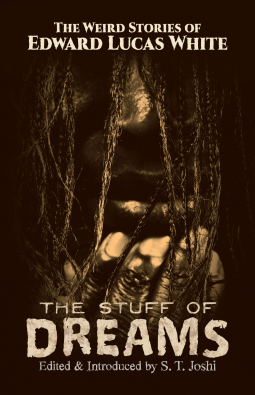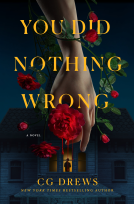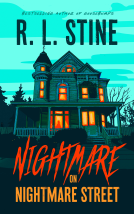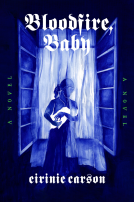
The Stuff of Dreams
The Weird Stories of Edward Lucas White
by Edward Lucas White
This title was previously available on NetGalley and is now archived.
Send NetGalley books directly to your Kindle or Kindle app
1
To read on a Kindle or Kindle app, please add kindle@netgalley.com as an approved email address to receive files in your Amazon account. Click here for step-by-step instructions.
2
Also find your Kindle email address within your Amazon account, and enter it here.
Pub Date Apr 20 2016 | Archive Date May 31 2016
Description
The collection features White's most famous story, "Lukundoo," a gripping fable of an American explorer who incurs the wrath of an African sorcerer. Other tales include "Sorcery Island," an uncanny foreshadowing of television's The Prisoner, "The Flambeau Bracket," "The House of the Nightmare," "The Song of the Sirens," and five other stories. Additional selections include the haunting poems "Azrael" and "The Ghoula" and an essay in which the author reflects on the influence of dreams in his fiction. Editor S. T. Joshi provides an informative Introduction to White's life and work.
Available Editions
| EDITION | Paperback |
| ISBN | 9780486806150 |
| PRICE | $9.95 (USD) |
Average rating from 24 members
Featured Reviews
 Renee G, Reviewer
Renee G, Reviewer
I really enjoyed this book. I couldn't put it down. My favorite one was the House of the Nightmare and The Message on the Slate. The Ghoula was another. I recommend you add this piece to your bookshelves.
I had never heard of Edward Lucas White which I suppose is not surprising considering he lived a century ago. The description intrigued me, since as a child I watched those old Vincent Price movies that were based on stories by Edgar Allen Poe and then later read everything by him that I could find in the library. I did enjoy these stories though you must keep in mind that people spoke (and wrote) differently all those years ago. I especially loved the first story Nightmare House about a man who seeks shelter in a run down house after an accident. The Message On The Slate was also very good, about a woman unhappy in her marriage who seeks advice from a clairvoyant who is a self proclaimed charlatan. I loved Lukundoo which concerned a curse. It gave me chills. In The Pig-skin belt a circus comes to town, as does a man with some strange and mysterious habits. My absolute favorite was The Picture Puzzle, in which a man and his wife find solace and perhaps something more when they occupy their time with puzzles after their daughter is kidnapped. I also loved The Ghoula, a poem about a female ghoul.
All in all well worth a read. 4 out of 5 stars from me.
I received an advance copy for review.
 Nicola M, Reviewer
Nicola M, Reviewer
This is a new author to me and the first few stories did not endear him to me but by the time I'd finished I realised I'd enjoyed more than not and all together they averaged out to a good 3.5/5 rating. He is quite wordy with his descriptions and that is where I thought his downfall was as a suspense writer as it was hard to keep the reader's attention when being bombarded with needless minutia. He did manage to make this work to the story's advantage in some circumstances. After reading the Introduction and end matter I am more interested in finding out more about the author himself than actually reading his other work. His stories were based on his dreams as he was a vivid dreamer. I am also, and can relate to an instance he tells in the afterword of waking from a nightmare and then going back to sleep to finish it!
Introduction - The book starts with an Introduction to the author giving a brief biography, an introduction to his works and discussing his forgotten status in the literary world. Never known for his weird tales, it is they that he is now best remembered for. The editor then explains where the stories in this book came from and how he curated them. Not exactly an exciting intro. but since I've never heard of this author before it does a well enough job to introducing me to what I will be reading. All the stories gathered here were written between 1905 and 1909.
1. The House of the Nightmare - A man is cruising in his "machine" and crashes in front of an old house. He meets a boy and spends a night in the supposedly haunted house. It's predictable from the beginning what the shock is going to be so quite a tame story. Pleasant enough reading though I found the writing quite wordy with unnecessary detail. Not an impressive introduction to the author. (3/5)
2. The Flambeau Bracelet - A man gives an accounting of himself after being accused of murder. It's a story from his youth, the justified reason for a duel, with a surprise ending. Very long-winded! (2.5/5)
3. Amina - Finally one that had me going.Taking place in Persia. This starts at the end with the aftermath and some child 'creatures' having been destroyed. Then goes back and tells the tale, how events came to pass and what the creatures actually are. I'm getting used to the author's meandering writing that takes time to get to the point. It works in this story. (4/5)
4. The Message on the Slate - A very long story and the best one so far. A woman goes to see a clairvoyant who confesses to her that he is a fraud. However a dream has brought her to him and he has seen her before in a vision. She wants to open the grave of her husband's dead first wife with whom he is still in love with. I liked the writing, this time, it flowed smoothly. He's a wordsmith for sure but the words each had purpose here. A spooky, atmospheric story. A good ending, but I did figure it out so not exactly shocking. (5/5)
5. Lukundoo - This is definitely a weird tale! Set in Africa, British explorers find a famous one of their ranks is in a nearby village sick and delirious with protuberances all over his body. With a doctor among them, they rush to his aid. They find him near death with an illness nothing medicine can relate too. Pretty gruesome if one uses their imagination to picture the scenes described but also a few parts have derogatory descriptions of African physical features. Another good story, though. (4/5)
6. The Pigskin Belt - Another long tale separated into sections.Starts off quite tedious and as I'm used to with this author by now, wordy. Way too much detail goes into the description of building a house for example. Anyway, the first half has the main character use the n-word a lot and the "negroes" all speak as if from a Mark Twin book so difficult to read the dialect. This aside, the Colonel is a liked character by all town members black or white. The story did become engaging in the middle when the author got on with the plot which was why was the Colonel was so jumpy all the time, carried holstered guns that shot silver bullets and had some other eccentric ways. I am beginning to wonder if this was one of those authors paid by the word as this would have been a better story at half the length but nevertheless, the longer I read the more captivated I became with where it was leading to. (4/5)
7. The Song of the Sirens - Terribly tedious, this took me four days to read while not being any longer than the previous tale. A sailing tale of a story told aboard ship in which the title tells us who (or what) the sailors meet. Three-quarters of the story are spent in description mostly not pertinent to the plot, then near the end, the titular tale is finally told. Boring! (0/5)
8. The Picture Puzzle - Finally a good story that I really quite enjoyed. It's actually a happy ending but has a paranormal element and the story flows well from beginning to end. The story of a miserable couple whose four-year-old daughter has been kidnapped. The only problem (and a big one when read in the 21st century) is that the story's logic is marred by prejudice, being attributed to "ignorant", "stupid", "jabbering" immigrants. (4/5)
9. The Snout - Perhaps the longest story at this point and the best one. A man recounts an unusual tale. He and two other thieves had robbed a recluse billionaire's mansion and the story is a full description of everything they found inside the estate. White's penchant for excruciating detail is put to good use here as each room is described of its contents and the further they go into the mansion the more and more we know that the sole inhabitant (excluding his manservant) is abnormal. Right from the beginning I was trying to guess what it was that the man had seen and I started off wildly incorrect but gradually got closer to the truth as did the thieves as they neared the recluse's bedroom. But just what he/it was is, even when revealed, left mysterious. (5/5)
10. Sorcery Island - Another enjoyable story. This is indeed a "weird tale" but not scary or creepy. A man recounts how he crashed on an island where he met a man he went to school with. The man had made the island his personal private island complete with a small inhabited European village, an Asiatic village of servants and a wildlife preserve. The man describes how he manages to escape once he realises no one is there entirely of their own free will. (5/5)
11 & 12. Azrael & The Ghoula - Two macabre poems. I don't like poetry. No ratings.
13. Edward Lucas White on Dreams: "Preface" to The Song of the Sirens (extract) & "Afterword" to Lunkundoo and Other Stories (extract) - Interesting to get the author's perspective. I'm also a vivid dreamer so I can relate. No rating.
 Althea M, Book Trade Professional
Althea M, Book Trade Professional
Fans may wish to be aware that this collection is nearly the same as White's collection, "Lukundoo," with the exception of two 'swaps.'
*** The House of the Nightmare Classic ghost story. After an auto accident, a stranded motorist encounters an odd boy who allows him to stay in his home overnight. The next day, after finding a mechanic, an eerie - but utterly predictable - revelation ends the tale.
*** The Flambeau Bracket In an Italian Renaissance setting, an experienced duellist tells the tale of what led him to kill his first opponent. Some nicely horrific moments, but the story ends abruptly, with some plot holes and unanswered questions that kept it from being wholly satisfying.
*** Amina Rhode Island is quite different from Persia. New to a diplomatic posting in this hot desert land, a young New Englander chafes at the restrictions placed on him in his new job, and one day, against advice, decides to go for a solitary walk. When he meets an unusually bare-headed, barefooted woman in an isolated location, he will finally learn what it is that both his colleagues and the local residents kept warning him about.
(One fascinating aside: "He remarked the un-European posture of her feet, not at all turned out, but with the inner lines parallel"... Who knew that walking pigeon-toed was considered to be "European"!?!?)
*** The Message on the Slate Although she's known for her intelligence and rationality, a dream drives a woman to do something utterly out of character for her - to consult a clairvoyant. Her unhappy marriage, she believes, has something to do with the burial of her husband's first wife. Since the funeral, the man's been no more than a ghost of the young man she once knew - and insistently loved.
There's a good story here, but the telling of it is a bit unnecessarily long-winded.
**** Lukundoo An old-fashioned, but effectively creepy tale. A group of anthropologists in search of unknown tribes in 'deepest, darkest' Africa unexpectedly encounters an old colleague - who has fallen victim to a grotesque curse.
Fairly certain I'd read this one before, long ago.
'Shawn' wrote, in a conversation about this story: "White seems, in fact, to be deliberately vague about the source of the curse. In Stone’s final conversation he asks one of the minnikins, “Has she forgiven me?” The response: “ ‘Not while the moss hangs from the cypresses,’ the head squeaked. ‘Not while the stars shine on Lake Pontchartrain will she forgive.’ ” It’s difficult to see how this reply relates in any way to the fetish-man. It seems instead to hint that the origin of the curse harks back to States and is somehow tied to the romantic entanglements described at length earlier in the story."
I would have to agree. The victim, Stone, also specifies that the curse was not laid on him from 'without,' but that it emanates from within his bones, which is why he has no hope of it being lifted. The poison that has ruined his life is within, part of his character, and he has taken that poison, and the knowledge of the people he has wronged and the ill deeds he has done, to Africa with him. Yes, his evil 'demons' manifest in a way that is "appropriate" to the setting, but I don't think that the reader is supposed to believe that a native shaman is responsible. Although certainly the story references and owes much to the genre involving fear of "primitive witchcraft," it's more about how people are unable to escape their own natures.
*** The Pig-skin Belt This one is more of historical interest than entertainment value, due to the casual racism displayed here. Sure, it's undoubtedly accurately reflective of the attitudes of the time and place portrayed (the American South) but it is present to such a degree that it will likely make most modern readers uncomfortable.
After a lengthy time away, a man returns to his hometown, and hires an old schoolmate to help him buy an estate. However, he's become strangely eccentric. He refuses to sleep indoors or attend social events at others' homes, and he's disturbingly insistent on constantly wearing a brace of pistols - loaded with silver bullets. Has he become mentally ill - or is there a valid reason for these quirks?
*** The Song of the Sirens A deaf seaman tells a sailor's tale of a tragic encounter with those Sirens of Greek myth, which he claims are all too real. And indeed, his encounter, deaf though he is, seems to have changed him...
The story's not bad, but I love reading older fiction for the little throwaway bits likes this:
"How do you pronounce, D-u-m-a-s?" he inquired?
"I am no Frenchman," I told him, "but Dumás is pretty close to it."
"That's what I said," he shouted, "and they all laughed at me and said, 'Doomus, ye damn fool.' Have you any of his books?"
**** The Picture Puzzle After their young daughter disappears; kidnapped, a couple subsumes their grief in an all-consuming obsession with jigsaw puzzles. The mindless activity helps keep them distracted from their loss. But then, the girl's mother develops a manic belief that her daughter will be home for Christmas. Her husband fears she is going mad - but then, the encounter a strange puzzle. In it, each sees a picture that reveals a clue that the other cannot understand.
The resolution is sweet - almost saccharine - and there's one unnecessary insult to immigrants that was a real speed-bump to the reading experience - but I couldn't help really enjoying this heartwarming Christmas story with an eerie twist.
*** The Snout Upon encountering an old acquaintance while visiting the zoo, a young man is overcome by shock and collapses. When he recovers, this is the tale he tells. He has recently been released from jail for his part in a burglary/heist gone bad. He was recruited by two acquaintances to take part in the crime: a robbery of a reclusive and fabulously wealthy heir. But what he encounters in the commission of the crime is most peculiar - and yes, related to the beginning of the story.
*** Sorcery Island Very dreamlike feel to this one. A man finds himself stranded on a tropical island. His solo biplane is aflame, and he has no memory of how he came to land on this island. By odd coincidence, the island is owned and its villages 'managed' by an old classmate of his, who was known for being eccentric, even as a boy. The island is now some sort of odd combination of wildlife refuge and James-Bond-villain-esque fortress/retreat. The stranded aviator is given every comfort - even luxury - but his old acquaintance seems to be in no hurry to offer him a means of getting home. And the longer he stays, the more he suspects that something ominous lies beneath the facade of this seeming paradise island.
Azrael A poem.
The Ghoula A poem (really liked this one). Relates to the earlier story 'Amina' - but from the opposite perspective.
Edward Lucas White on Dreams A bit of writing or writing, formerly published as introductory material or Afterwords to some of the stories included here.
Many thanks to NetGalley and Dover publication for a copy of this book, and allowing me to become more familiar with this author. As always, my opinions are solely my own.
Readers who liked this book also liked:
Yushi Kawata, Yukito
Comics, Graphic Novels, Manga, Entertainment & Pop Culture, Humor & Satire


















